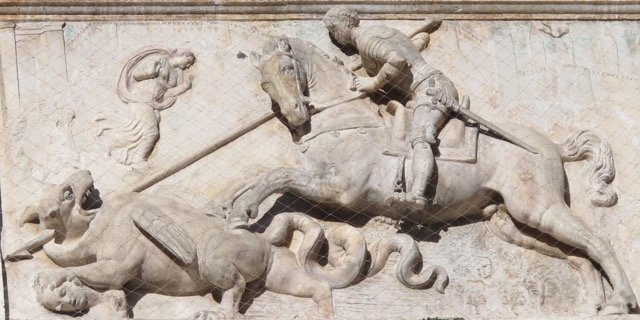The besieged house of Temperance in Book II sets at point the ‘hewing and slashing’ blades of the knights Arthur and Sir Guyon against a climactic opponent: an insubstantial, gnat-like ‘swarme’ urged on by their ‘cruell Captaine,’ Maleger, a terrifying more (and less)-than-human figure (II.ix.15). The traditional allegorical exegesis reads this battle as one between the temperate body and intemperate forces and passions. But it also illuminates an ecological conundrum. How is the fragile embodied human to survive the onslaught of determined ‘shades’ (II.ix.15), whose lack of concrete ‘substaunce’ and overwhelming numbers requires the assistance of a ‘fierce Northerne wind’ to ‘blow them quite away’ (II.ix.16)? Read more…
This cluster of eco-essays about Spenser and environmental thinking was born as an MLA panel. In January 2020, in what someday we may think of the last pre-COVID conference, I gathered together a panel of Spenserians to take poetic measure of our environmental bubblings-over, as bushfires and floods were lighting up our screens large and small. Early on Sunday morning I arrived at room 604 of the Washington State Convention Centre, wanting to set the scene for the beastly glories of session #666, lurking in the hangover slot at the bitter end of the conference. The room was empty. Read more…
What might happen if a few intrepid ecologically-minded literary scholars of sixteenth-century England were to turn their eyes and ears towards the various entities populating the woodcuts accompanying Edmund Spenser’s 1579 The Shepheardes Calender? What might the clouds, the innocuous seeming fences and borders, the still cottages, grazing sheep and simple landscapes, even the homely human shepherds, say? What insights might they tell us about their environment or their eclogue? How might they speak of the past to the present moment of 2020? Tiffany Jo Werth introduces and curates short musings from Chris Barrett, Todd Borlik, Dennis Britton, Vin Nardizzi and Jessica Rosenberg which tease out the structural functions of non-typographical elements, reading them against the textual grain, and listening to how the visual environs of The Shepheardes Calender are a haunting of— uninhabitable and inhospitable—worlds. Read more…
This special review section on Spenserian Ecological futures highlights advanced Ph.D. candidates and early career scholars who are thinking with Spenser to explore entanglements with the more-than-human world. Tasked with offering an ecocritical close reading of a single stanza, the contributors explore these entanglements through political sovereignty, environmental catastrophe and racial injustice to name a few. A variety of voices from young scholars in England, Canada and the United States provide new perspectives. Collectively, they offer a wide array of new ecological angles on Spenser’s work as they think through water, soil, animals such as rams, allegorical ciphers like Errour and more. Traversing nearly every book of The Faerie Queene and the less-theorised Amoretti, this collection of short close readings showcase how our current ecological crises have long practical and theoretical histories within Spenser’s works. Read more…
Towards the end of the ominously numbered session #666, ‘Spenser, Ecology and the Dream of a Legible Environment’, at the 2020 Modern Language Association meeting in Seattle, Washington, presider Steve Mentz pondered something like the following: ‘As we have seen today, there is something about Spenser that encourages ecological thinking’. Certainly, the panel merited some such positive pronouncement, especially given how engaging all the papers had been […] Full of thoughts generated by panel #666, I wrote this short essay to explore what it might be about the world of the Faerie Queene that proves hospitable to ecological thinking. Along the way I redact some of the most recent essays and book chapters I have found most helpful to my thinking as I have tried to transform my quasi-automatic reaction into something like a response. Read more…
Please click here.

Bas relief from the exterior of the Scuola San Giorgio degli Schiavoni in Venice. Photo courtesy of Roger Kuin.
- Todd Andrew Borlik, ed., Literature and Nature in the English Renaissance: An Ecocritical Anthology —
- Victoria Coldham-Fussell, Comic Spenser: Faith, Folly, and The Faerie Queene —
- Jennifer C. Vaught, Architectural Rhetoric in Shakespeare and Spenser —
- Megan L. Cook, The Poet and the Antiquaries: Chaucerian Scholarship and the Rise of Literary History, 1532-1635 —
- Ross W. Duffin, Some Other Note: The Lost Songs of English Renaissance Comedy —
- Peter Remien, The Concept of Nature in Early Modern English Literature —
- Gordon Teskey, Spenserian Moments —
- Gerard Passannante, Catastrophizing: Materialism and the Making of Disaster —
